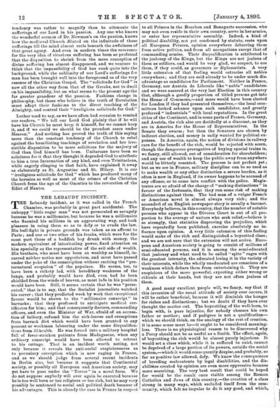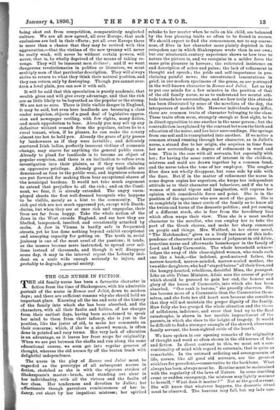THE LEBAUDY INCIDENT.
THE Iiebaudy incident, as it was called in the French Chamber, was probably in great part accidental. The unhappy "little sugar man" was not persecuted so savagely because he was a millionaire, but because he was a millionaire who flaunted his millions in an aggravating way, and took pleasure in using them so as to defy or to evade the law. His bull-fight in private grounds was taken as an affront to Paris ; and one or two other of his freaks, which were for the most part those of a baddish boy drunk with money, the modern equivalent of intoxicating power, fixed attention on him specially as the representative of the evil side of wealth. His brothers, who must have been as wealthy as himself, in- curred neither notice nor opprobrium, and must have passed under the yoke of the conscription without exciting the "pre- ternatural suspicion" of the populace. He seems, too, to have been a rickety lad, with hereditary weakness of the lungs, and probably would have died, even had he been shielded from the winds of heaven, as most lads in his position would have been. Still, it seems certain that he was "perse- cuted," that is to say, that the Socialist journalists watched his career ; that they predicted week by week that exceptional favour would be shown to the "millionaire conscript" in barracks ; that they professed to anticipate medical cer- tificates for him; and that consequently doctors, commanding officers, and even the Minister of War, afraid of an accusa- tion of bribery, refused him the sick-leaves and exemptions from barrack diet which would have been granted to any peasant or workman labouring under the same disqualifica- tions from ill-health. He was forced into a military hospital full of fever-stricken patients from Madagascar, when any ordinary conscript would have been allowed to retreat to his cottage. That is an incident worth noting, not only because it reveals the anti-social suspiciousness as to pecuniary corruption which is now raging in France, and as we should judge from several recent incidents in Berlin also, but because it suggests that Continental society, or possibly all European and American society, may yet have to pass under the " Terror " in a novel form. We do not suppose anybody will ever again be executed because he is too well born or too religious or too rich, but he may very possibly be sentenced to social and political death because of his advantages. This is already the case in France in respect
to all Princes in the Bourbon and Bonaparte succession, who may not even reside in their own country, serve in her armies, or enter her representative assembly. Indeed, a kind of political disability, not yet confirmed by statute, rests upon all European Princes, opinion everywhere debarring them from active politics, and from all occupations except that of commanding armies. Their disqualification is attributed to the jealousy of the Kings, but the Kings are not jealous of them as soldiers, and would be very glad, we suspect, to use them, if they could, as governors or diplomatists. A very little extension of that feeling would ostracise all nobles everywhere; and they are said already to be under much dis- advantage as candidates for Parliament. Neither in France, Germany, nor Austria do Liberals like "noble" candidates, and we were assured at the very last Election in this country that, although a goodly proportion of titled persona got into the House of Commons,—and more would have been elected for London if they had presented themselves,—the local com- mittees looked askance upon such candidates, and greatly preferred " industrials " with local reputations. In the great cities of the Continent, and in some parts of France, Germany, and Austria, the rich also are decidedly at a discount, as they are in America for the House of Representatives. In the Senate they swarm; but then the Senators are chosen by indirect election, and money is sadly wanted for political ex- penses. In America, again, the notion of divisions in railway cars for the benefit of the rich, would be rejected with scorn, though the dangerous prerogative of buying special trains is, we fancy, still allowed, out of consideration for shareholders; and any use of wealth to keep the public away from anywhere would be bitterly resented. The process is not perfect yet ; but as we see in France, military discipline can be so used as to make wealth or any other distinction a severe burden, as it often is now in England, if its owner happens to be accused of any offence, or to come into conflict with the police. Magis- trates are so afraid of the charge of "making distinctions" in favour of the fortunate, that they run some risk of making distinctions against them. The bad man of a vulgar French or American novel is almost always very rich ; and the scoundrel of an English newspaper-story is usually a baronet. Everybody believes, in this country, that the number of notable persons who appear in the Divorce Court is oat of all pro- portion to the average of suitors who seek relief—believe it so strongly, that statistics disproving the prejudice, which have repeatedly been published, exercise absolutely no in- fluence upon opinion. A very little extension of this feeling would make of the rich and distinguished a boycotted class; and we are not sure that the extension will not arrive. Euro- pean and American society is going to consist of millions of semi-educated persons, and it is among the semi-educated that jealousy and what used to be called " spite " rages with the greatest intensity, the educated losing it in the variety of their interests, while the wholly uneducated are conscious of a weakness which debars them from entertaining it. They are suspicious of the more powerful, expecting either wrong or ridicule at their hands, but they are not often jealous of them.
A good many excellent people will, we fancy, say that if this inversion of the usual attitude of society ever occurs, it will be rather beneficial, because it will diminish the hanger for riches and distinctions ; but we doubt if they have ever thought the matter out. The boycotting of the well-born, to begin with, is pure injustice, for nobody chooses his own father or mother; and if pedigree is not a qualification— which we should think, on the analogy of the rest of creation, it in some sense must be—it ought to be considered meaning- less. There is no physiological reason to be discovered why a Percy should not be as useful as a Smith. The effect, again, of boycotting the rich would be almost purely injurious. It would set a class which, while it is Buffered to exist, cannot be deprived of a large portion of its powers, outside the social system,—which it would consequently despise, and probably, so far as positive law allowed, defy. We know the consequences of breeding malcontents by legal disabilities, and the dis- abilities created by opinion are even more oppressive because more searching. The very best result that could be hoped for would be the result once visible among the Roman Catholics and Jews of this country,—the creation of a class strong in many ways, which secluded itself from the com- munity, which felt no impulse to do it any good, and which, being shut out from competition, comparatively neglected culture. We are all now agreed, all over Europe, that such exclusions are bad in their effects ; yet all over Europe there is more than a chance that they may be revived with this aggravation,—that the victims of the new tyranny will never 'be really weak, will never be without certain powers, will never, that is, be wholly deprived of the means of taking re- venge. They will be innocent men déclassé; and if we want dangerous revolutionaries in politics or literature, we must tnnitiply men of that particular description. They will always strive to return to what they think their natural position, and they can return only by destroying. Though you cannot over- turn a level plain, you can sow it with salt.
It will be said that this speculation is purely academic, that wealth gives and will give every advantage, and that the rich .are as little likely to be boycotted as the popular or the strong. We are not so sure. There is little visible danger in England, it may be said, but even here landlords are becoming a class nnder suspicion, objects of a good deal of legislative oppres- sion and newspaper reviling, with few rights, many duties, And much opprobrium to bear. Already you may sell up any defaulter without remark from the populace, unless he is a rural tenant, when, if he pleases, he can make the county .almost too hot to hold you. Already the grace of pity passes by landowners as if they were invisible; and delicately nurtured Irish ladies, perfectly innocent victims of economic -change, may starve for anything the general public cares. Already to plead for landlords is to become an object of spopular suspicion, and there is an inclination to refuse even 'investigation into their plaints, as if they were claiming An oppressive privilege. Already great city landlords are denounced as foes to the public weal, and ingenious schemes are put forward for making them bear exceptional shares of the municipal burdens. It would not take much argument -to extend that prejudice to all the rich ; and on the Conti- nent, we fear, it is already extended. The angry unem- ployed shoots the first well-dressed bourgeois who happens to be visible, merely as a hint to the community. The rich qud rich are not much oppressed yet, except with Death- duties, but when they are at once rich and unpopular, their lives are far from happy. Take the whole nation of the Jews in the West outside England, and see how they are libelled, lampooned, insulted, and occasionally attacked by -mobs. A Jew in Vienna is hardly safe in frequented streets, yet he has done nothing beyond exhibit exceptional and annoying capacity for getting on. The truth is, social jealousy is one of the most cruel of the passions; it tends, as the masses become more instructed, to spread over mil- lions instead of thousands, and though it will disappear some day, it may in the interval repeat the Lebandy inci- dent on a scale wide enough seriously to injure, and ,probably to degrade, general society.















































 Previous page
Previous page